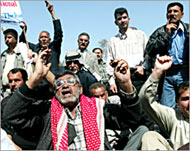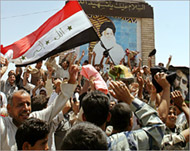Iraqis sidelined during Bremer reign
After Paul Bremer handed over “sovereignty” to the Iraqi interim government on Monday, he reflected on his 13 months as de facto ruler of the country.

Despite the ongoing insurgency that has included a series of car bombings and kidnappings nationwide, he said he was leaving Iraq “confident in its future”.
“Anybody who has any doubts about whether Iraq is a better place today than it was 14 months ago did not see the mass graves of Hilla,” he said.
“Or see any of the torture chambers, or rape rooms throughout this country… Iraq is a much better place, absolutely.”
Two hours later, the 62-year-old diplomat boarded a plane at Baghdad International Airport on his way to an undisclosed location.
However, not everyone would agree with Bremer’s assessment of his performance.
Critics say during his time in Iraq the US’s top official entrenched American interests at the expense of the Iraqi people.
And they contend his lasting legacy will be continuing Iraqi scorn for those that rule over them.
US-led invasion
Paul Bremer took charge of the Coalition Provisional Authority, (CPA) the occupation administration, on 12 May 2003 – around a month after the successful US-led invasion of Iraq.
Two of his first moves proved to be his most controversial – a de-Baathification policy and the disbandment of the Iraqi army and security forces.
|
“Bremer epitomised the foolishness and ignorance of US policy towards Iraq” Imad Khadduri, |
Bremer argued he had to take these measures to convince the Iraqi people that Saddam Hussein’s regime had passed into history.
He said there was no room for Baath party ideology and that the top levels of the party should be purged.
This led to tens of thousands of people becoming unemployed overnight and, critics say, many of them fuelled the resistance.
Bremer would later claim the Iraqi Governing Council, which he appointed, had been too zealous in it purges.
However, he maintained the moves were popular and prevented many revenge killings.
Flawed policies
Daniel Neep, an Iraq expert at London’s Royal United Services Institute (RUSI), says that despite Bremer’s justifications, the policies were flawed.
“We can see now that these were clearly errors. But in the context of the time you have to understand that the Iraqi army was effectively disbanded anyway and Bremer was under pressure to act.”
Imad Khadduri, a former Iraqi nuclear scientist and now a political commentator, is more damning.
 |
|
Thousands lost jobs after the |
“Bremer epitomised the foolishness and ignorance of US policy towards Iraq. The Baath party was deeply entrenched in Iraqi society and they were planning for occupation long before it actually happened.
“They were actually preparing for armed resistance. Bremer’s policies only fuelled that.”
He added: “The recent devastating attacks in Iraq in the run-up to the handover were a small example of what the resistance can do. We should expect more attacks in the near future with even more advanced tactics and weaponry.”
Bremer’s next major move was to appoint the 25-member Iraqi Governing Council in July 2003.
The council was tasked with producing a temporary constitution with a view to direct elections being held in 2005.
Iraqi Governing Council
It had some significant powers – it could appoint and dismiss ministers and controlled the national budget.
Bremer said the council was comprised of a broad spectrum of Iraq’s communities and had some big hitters on it.
However, the CPA retained real power. It controlled security and could veto decisions made by the council.
Daniel Neep says Bremer’s enduring legacy would be the way he sidelined the council during his time in power.
|
“There will be a lot Paul Bremer, |
“Undoubtedly Bremer marginalised the Iraqi Governing Council, and reduced it to an ineffectual body. This has affected the legitimacy of the new interim government in the eyes of many Iraqis. It will have to work very hard to overcome that.”
But it was Iraq’s precarious security situation that dominated Bremer’s time in charge.
According to Iraq bodycount.com, thousands of Iraqi civilians were killed as a result of the military occupation, as well as more than 700 US soldiers.
The main challenges to the US-led occupation came from rebellions in central Iraq and the Shia-dominated south.
Iraqi rebellions
In Falluja, west of Baghdad, US forces laid siege to the town in April after four US security contractors were killed.
They said they would “flush out” a small number of “Saddam loyalists” and “terrorists”.
During the siege, it is estimated more than 600 Iraqis were killed and the US was accused of abuses by international human rights groups.
 |
|
Shia Muslims loyal to Muqtada al- |
After weeks of fighting, the US was forced to cut a deal with local insurgents who they allowed to run the town.
Also in April, Bremer shut down Shia leader Muqtada al-Sadr’s newspaper and called for his arrest in connection with the death of another Muslim cleric.
The moves sparked protests that turned into a deadly uprising among a previously quiescent community.
Bremer said his hand was forced by al-Sadr’s newspaper inciting attacks against the coalition.
But after weeks of fiery rhetoric and clashes between occupation forces and al-Sadr’s Mahdi Army, Bremer’s administration stopped demanding al-Sadr’s arrest and offered to negotiate to disband his militia.
US successes?
Neep says although events in Falluja and the Shia south may have seemed like a setback for the US, they will probably serve as a blueprint for future operations.
“The situation in Falluja and Najaf posed two great challenges. But the Bremer formula of effectively sharing power with local insurgents will probably be followed up by the interim government.”
|
“There is no doubt Daniel Neep, |
Away from the spotlight, the CPA says Bremer has scored other, less publicised, successes.
For example, they say he restructured the central bank and replaced Saddam Hussein’s devalued and easily counterfeited currency.
They also claim the occupation authority has designed an open economy, with free trade, low taxes, and liberal foreign investment laws.
The seeds have been planted for a representative government in Iraq, Bremer says, and government has been decentralised so that provinces have more power.
“No doubt there are a lot of other problems here,” he told reporters recently. “And there will be a lot more violence here, particularly I think in the next few months as we run towards elections.
US hegemony
“But a lot of the structural changes that are needed for the end state of a stable Iraq are in place now.”
RUSI’s Neep is less positive in his assessment.
“There is no doubt that Bremer’s was a extremely difficult job given the complexity of the Iraqi situation, and to pin the blame or give credit to one person would be misleading. There were numerous other actors involved.”
 |
|
Security problems dominated |
But Imad Khadduri says Bremer was ultimately responsible for entrenching US hegemony in Iraq.
“It is true there have been cosmetic improvements – for example, salaries have gone up. But you have to look at the bigger picture.
“Bremer has implemented US economic policies and invited in the big US companies to control the Iraqi economy while millions of Iraqis are unemployed.
“And don’t forget,” he added. “The guy he has left in charge of the country, Iyad Allawi, has by his own admission been paid by foreign intelligence agencies.
“How can Iraqis be sure that he will make decisions in Iraq’s interests, especially when the US is pulling the strings from behind the scenes?”